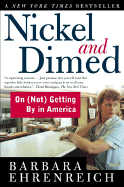
“The New York Times bestseller, and one of the most talked about books of the year, Nickel and Dimed has already become a classic of undercover reportage."
“Millions of Americans work for poverty-level wages, and one day Barbara Ehrenreich decided to join them. She was inspired in part by the rhetoric surrounding welfare reform, which promised that any job equals a better life. But how can anyone survive, let alone prosper, on $6 to $7 an hour? To find out, Ehrenreich moved from Florida to Maine to Minnesota, taking the cheapest lodgings available and accepting work as a waitress, hotel maid, house cleaner, nursing-home aide, and Wal-Mart salesperson. She soon discovered that even the "lowliest" occupations require exhausting mental and physical efforts. And one job is not enough; you need at least two if you intend to live indoors.
“Nickel and Dimed reveals low-wage America in all its tenacity, anxiety, and surprising generosity -- a land of Big Boxes, fast food, and a thousand desperate strategies for survival. Instantly acclaimed for its insight, humor, and passion, this book is changing the way America perceives its working poor.”
“Millions of Americans work for poverty-level wages, and one day Barbara Ehrenreich decided to join them. She was inspired in part by the rhetoric surrounding welfare reform, which promised that any job equals a better life. But how can anyone survive, let alone prosper, on $6 to $7 an hour? To find out, Ehrenreich moved from Florida to Maine to Minnesota, taking the cheapest lodgings available and accepting work as a waitress, hotel maid, house cleaner, nursing-home aide, and Wal-Mart salesperson. She soon discovered that even the "lowliest" occupations require exhausting mental and physical efforts. And one job is not enough; you need at least two if you intend to live indoors.
“Nickel and Dimed reveals low-wage America in all its tenacity, anxiety, and surprising generosity -- a land of Big Boxes, fast food, and a thousand desperate strategies for survival. Instantly acclaimed for its insight, humor, and passion, this book is changing the way America perceives its working poor.”
I give it: 3 out of 5 stars
Review by: Caressa
As noted in my English class, Nickel and Dimed is not, in any way, a bad piece of literature. The writing is very intelligent. It follows the activity of the author as she tries to live on minimum wage and share her experience. Nor, and I will not argue, can anyone say the narrator is not a reasonably good character and person to follow as she continues through these steps. She's very educated. The story was relevant, clearly written, and entertaining.
However, in the intro and epilogue particularly, I was not, for lack of a better word, wowed by Ms. Ehrenreich's approach to poverty. As she mentioned, she had the best possible conditions going into the work force and still, three times in a row, she failed to live on her wages and advantages. I found this book almost like a prequel exploring the impossibility of minimum wage and living on it before the actual series can step in and explain how persons (emphasis on the fact these are real individual people [hence the persons]) accomplish the impossible.
I'd also like to note, although this branches away from the book, how so many co-workers, particularly females, need to maintain a marital relationship in order to support themselves. Relationships can be a considerable amount of effort especially in situations where both partners work more than one job. I think this is an interesting factor in the economy.
Also, a great (older) friend of mine majored in psychology. Because of her disadvantageous location, she could not use her degree to get a job. She worked several waitressing and underpaying jobs before finally going back to college to pursue a degree in Math Education. This put her further and further in debt. Many of the workforce today have a college education and loans to pay.
Whatsoever, the book is outdated, and it was very informative for its time. It's an interesting book I'd recommend to many readers. If you're looking for a story about the real world, without much interest on the reflection surrounding the story, skipping the introduction and epilogue will easily keep you entertained with a short, intriguing read. If you're interested in the psychology of it or the debt problems the world is facing, I definitely suggest this piece of nonfiction. I hope you enjoy! A bientot! -C
I had heard about this book and was wondering what it was like. Thanks for reviewing it.
ReplyDeleteThanks for posting Sharon. :) It's a rather hot debate topic in my English class. I'm glad you liked it. -C
ReplyDelete